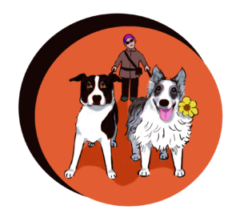 For several years I searched for a really comprehensive dog training and behaviour programme (and wishing one existed in Canada, ideally in the post secondary education system).
For several years I searched for a really comprehensive dog training and behaviour programme (and wishing one existed in Canada, ideally in the post secondary education system).
I had my criteria:
- Positive reinforcement based. I have no interest in a “survey” course of various training methods. This rules out quite a few.
- Suits my schedule. I need to fit this programme into a work life that occasionally takes all of my time and brain cells in bursts. More thinking, reflecting and doing time, and less scheduled time suits me best.
- I can do this in Canada.
- The programme does not use a transmissive teaching / mastery learning model. I’ve taken a few courses based on that model, and while they are useful for foundational topics, they lack depth.
- I’m learning with actual people and not just pre-recorded content or activities that might as well be recorded (p.s. talking heads are not webinars!)
- Assessment of learning is authentic — more than automated quizzes.
- The programme’s reputation is based on quality and not slick marketing strategies.
- The progamme does not require that I put my own dogs in uncomfortable situations. For example, Karen Prior Academy has scheduled workshop weekends as part of their Dog Trainer Professional course. This would require travel and little time to get acclimated. Excellent practical component but not a good match for my crew.
- Goes deep. I do heaps of reading and learning on my own, so I don’t want to begin with Dog Training 101.
One morning in May I was scrolling through Facebook and came across this post from Kay Laurence:
I am please to announce that after much persuasion I am starting another 2 year online trainers course (TAKL: Trainer Accredited by Kay Laurence).
This is limited to 25 students, who have a keen desire to train, learn more about training, do better, dig deeper, clear out the fluffy parts for super clean, mind-flowing, can’t-stop-me-now lifelong abilities and skills.
I’ve made a habit of seeking out opportunities to learn from Kay Laurence for years — learning labs at Clicker Expo, her blog, articles, books, Facebook conversations… She is one of the top trainers in the world, and has never relaxed in that fame. She continues to question and rethink, and expects the same from everyone else. Sound ideal? It is.

Here are some highlights and struggles so far
- The course structure and elements provide rhythm, anticipation, and predictability. Our scheduled “real time” together is text-based, brisk, and took some getting used to. I’ve experienced this “synchronous forum” format before through Staffordshire University’s Best Practice Models community, so at least I felt like I had a bit of a head start.
- We are an international learning community. This is quite different from a course based in a country where international participation is also welcomed. Although, I have noticed some stronger ties with individuals who benefit from on location workshops at WagMore barn. Maybe I’ll get there one day but I’ll remain envious for now.
- My sister, Julia Morton, is also taking the course so I have a study buddy. What a difference that makes!
- It is very gently scaffolded. How you track your goals, planning, training, and progress is up to you. This is daunting and it’s taken me awhile to nail down a system that still isn’t quite working 😉
- Moodle is used for our course environment, which feels like home to me being a Moodle user since it 2003. I dodged a learning curve!
- It is competency based, and there is a great deal of flexibility in how you present your evidence of learning. Video is an obvious medium to use — effective but very time consuming. When it comes to editing video I’m a huge procrastinator.
- Feedback comes from all directions — peers, Kay, and tutors. The more formal assignments are called Individual Learning Activities (ILA) and there is an option to revise/refine and resubmit for additional feedback. I really appreciate this living document approach. After all, the learning is never finished.
- Reflective practice is a huge component, and ties back to the competencies and the learning portfolio we’re assembling as we go. (The assembly is picking up speed as we approach the end of year 1!)
The recent TAKL graduates can tell you more about this journey. Meanwhile, wish me luck on completing TAKL year 1!
